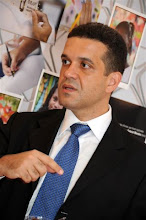Archive for January 2007
Innovative Brazil book
 The National Agency for Financing Studies and Researches - Finep has launched the book "Innovative Brazil, the Enterprising Challenge", where success stories of the 40 more innovative brazilian companies are listed. Companies like Petrobras, Embraer, Braskem, Pipeway, Troller, Embrapa, Lupatech, Weg, Polymar, Nuteral and Modulo Security are among others.
The National Agency for Financing Studies and Researches - Finep has launched the book "Innovative Brazil, the Enterprising Challenge", where success stories of the 40 more innovative brazilian companies are listed. Companies like Petrobras, Embraer, Braskem, Pipeway, Troller, Embrapa, Lupatech, Weg, Polymar, Nuteral and Modulo Security are among others.Modulo Security, for instance, is the brazilian information security company. At the book you can learn about the history of the three partners that started the company after left the software engineering course at Federal University of Rio de Janeiro - UFRJ and how Modulo was transformed into the market leader of its sector. With more than 4 thousand national and international projects implanted, many of them innovative ones as the security of the Brazilian Voting Machines and the transmission of the income tax through the InterNet. Modulo was the first information security company of the world to get the ISO 27001 certification, first world-wide norm of information security.
Lobo
 Founded in '94 by three friends, two of wich are partners to this day, with the intention of having a good time and maybe some work, Lobo presents itself as a design and animation studio. The team of artisans leaded by Creative Director Mateus Santos seeks to employ the full extent of its capabilities to the craft, with the constant objective of doing unique work every time around.
Founded in '94 by three friends, two of wich are partners to this day, with the intention of having a good time and maybe some work, Lobo presents itself as a design and animation studio. The team of artisans leaded by Creative Director Mateus Santos seeks to employ the full extent of its capabilities to the craft, with the constant objective of doing unique work every time around.Represented worldwide by The Ebeling Group, and teamed up with major 3D and post-production company Vector Zero, Lobo has grown quite a bit since the early days, but being aimed towards quality more than quantity, the team has now reached a solid set up. Designers, animatiors, illustrators, editors, plus a writer and a sound designer, all coming from veried backgrounds, compose the current team. This provides Lobo with a strong foundation for a broad range of projects.
 From TV packages for Germany's Viva Networks, to the far out concepts and graphics for Diesel, Lobo's clients so far include Panasonic, Boomerang Channel, Gessy-Lever, Toyota, Sony Playstation, Anime Channel, Subaru, Cartoon Network, OLN, CMT, AMC, McCann Erickson, Kessels Kramer, Ogilvy & Matter Worldwide, Saatchi & Saatchi, BBDO, MTV and Disney.
From TV packages for Germany's Viva Networks, to the far out concepts and graphics for Diesel, Lobo's clients so far include Panasonic, Boomerang Channel, Gessy-Lever, Toyota, Sony Playstation, Anime Channel, Subaru, Cartoon Network, OLN, CMT, AMC, McCann Erickson, Kessels Kramer, Ogilvy & Matter Worldwide, Saatchi & Saatchi, BBDO, MTV and Disney.Lobo's worldwide recent media attention includes reviews and interviews on magazines and books such as Creativity, Creative Review, Desing is Kinky, Die Gestalten, Etapes, How, ICG, Plus 81 and XFuns.
Lobo
Phone: 55 11 3709.2222
email: info@lobo.cx
Site: http://www.lobo.cx
Adapter for helmets and earplugs
 The helmet adapter is one of the company’s top-of-the-line products. It is characterized by especially innovative features such as a lever and bending system, using torsion springs with a spin gauged to move the earplugs backwards. It also has a smaller amount of parts than its competitors, and uses simplified tooling. It can be adapted to any helmet brand. It is injected in ABS and receives a fiberglass load to cope with the wear and tear. With less movements and adjustments, users can remove and put the earplugs on intuitively, which contributes to improve their work conditions. The product was developed in Brazil with technical, functional and formal aspects that compete in equal conditions with imported products.
The helmet adapter is one of the company’s top-of-the-line products. It is characterized by especially innovative features such as a lever and bending system, using torsion springs with a spin gauged to move the earplugs backwards. It also has a smaller amount of parts than its competitors, and uses simplified tooling. It can be adapted to any helmet brand. It is injected in ABS and receives a fiberglass load to cope with the wear and tear. With less movements and adjustments, users can remove and put the earplugs on intuitively, which contributes to improve their work conditions. The product was developed in Brazil with technical, functional and formal aspects that compete in equal conditions with imported products. Manufacturer:
Manufacturer:Bells Ind. e Com. de Plásticos Ltda
Pinhais, Brazil
http://www.bells.ind.br
Design:
Mega Box Design S/S LtdaAguilar Selhorst Jr, Felipe Locatelli, Nelson Kuster Jr
Quatro Barras, Brazil
http://www.megaboxdesign.com.br/
Brazil innovation and environment
The substitution of CFC on chemistry industries and consummer goods in Brazil is a good example. The importation of gas CFC and the use of herbicide bromide of metila, two of the main substances that destroy the ozone layer, are forbidden in Brazil since the first day of 2007 by the Brazilian National Environment Council (Conama).
Currently, the CFC survives basically in old equipment, refrigerators, residential and automotive air-conditional equipment. The CFC alone only leaves the industrial plant, today, in the cases of "essential uses", as in the bomblet used in the treatment of the asthma. It is an exception in the Montreal protocol, but its use is restricted and can finish for complete, therefore a study government foresees the substitution to it of the CFC of the bomblets for another product researched in the program of Elimination of the Production and Consumption of the Substances that Destroy the Ozone Layer. The Program counts on financial resources of Protocol Multilateral Fund, that, until 2010, will invest USS 26,5 million in brazilian system of innovation.
The CFC of old equipment, as what it puts into motion refrigerators manufactured before 2000 (the posterior ones does not contain CFC), the call "cooling gas", will be recicled to keep in operation old equipment. With resources of Multilateral Fund, a Central office of Regeneration (bank of supply of the gas) was mounted in São Paulo. In 2007, another one will be opened, in Rio de Janeiro. One program of training of "refrigeristas" prepares low-income people who work in the collect of the CFC in refrigerators. Instead of liberating the gas for the atmosphere, them they direct to a regeneration central office.
Such policies are the building blocks of democratic and decentralized social and technological networks and efficient and multiple innovation environments represent today essential conditions for environmentalism.
O Boticário
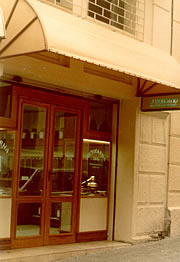
O Boticário was created in 1977 as a small prescription drugstore in the city of Curitiba, capital of the state of Paraná, in southern Brazil. Today the company is the world’s largest perfumery and cosmetics franchising network. It has 2,114 stores in Brazil, 52 in Portugal, 4 stores in Mexico, 5 stores and 6 points of sales in Bolivia, 2 in Peru, and 2 in Paraguay, and its products are marketed in 438 points of sale in Japan.
O Boticário is perceived by its customers as a company that creates and distributes products that express sensitivity, harmony, and beauty; as a company that is a reference in innovation and high quality, and whose actions translate its absolute respect for the environment.
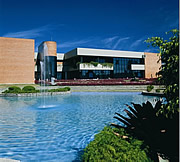
O Boticário’s product lines consist of approximately 480 items, divided into the following categories: body care, facial care, sun care, makeup, deodorizing colognes, deodorants, soaps and shampoos. All of them developed with the most advanced production and research techniques.
In addition to traditional ingredients such as almond oil, chamomile, eucalyptus, and grape, O Boticário consistently invests in new active ingredients research so that it can go on offering unique products. Amazonian plants such as assai, cupuaçu, carnaúba, guaraná, cashew, and passion flower; gums extracted from algae and vegetal extracts, such as arnica, and urucum are among the active ingredients present in the brand’s products.
O Boticário is a modern company, in synchrony with international market trends, and greatly concerned with the quality of the products it manufactures and customer well-being. By means of regular domestic and international surveys, the company has succeeded in developing world-class products, be it through their innovative packaging or through the use of first-class raw-materials, using the most advanced technology in packaging, formulations, and design.
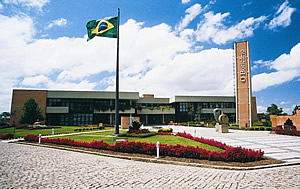
O Boticário’s industrial and administrative complex has 34.4 thousand square meters of floor space in the city of São José dos Pinhais in the Curitiba Metropolitan Area. It employs 1,300 people and creates approximately 10 thousand jobs through its franchising network. O Boticário’s first manufacturing plant was inaugurated in 1982, with just 1 thousand square meters of floor space. Then it employed 27 people who worked to manufacture about 400 thousand items a year. O Boticário’s current production exceeds 59 million units.
In 1990, the O Boticario Nature Conservancy Foundation became a landmark in terms of support to conservationist projects, and is widely recognized abroad. UNESCO declared the Salto Morato Natural Reserve a natural heritage site, in 1999.
FEBRACE
 The Science and Engineering Brazilian Fair - FEBRACE comes fulfilling an important social paper stimulating the creativity and the reflection in students of the basic education through the development of sciences and engineering projects. The FEBRACE means 5 years discovering new talents and stimulating the research culture, innovation and entrepreneurship in Brazil.
The Science and Engineering Brazilian Fair - FEBRACE comes fulfilling an important social paper stimulating the creativity and the reflection in students of the basic education through the development of sciences and engineering projects. The FEBRACE means 5 years discovering new talents and stimulating the research culture, innovation and entrepreneurship in Brazil. The FEBRACE history is composed of pupils, professors, parents and schools that together show to the Brazilian society that they learn to learn, that they can want and that they can do.
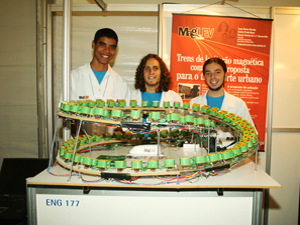
The FEBRACE objectives are: - to stimulate new vocations in Sciences and Engineering through the development of creative and innovative projects; - to approach the public and private schools of the Universities, being created chances of spontaneous interaction between the students and professors of the schools with the university community (students, professors, employees), for one better understanding of the papers of the Universities in Education, Research, Culture and Extension.

The FEBRACE is a fair affiliated to Intel ISEF - International Fair of Sciences and Engineering - carried through annually in May in U.S.A. in different cities of the country. It is the biggest fair for students who had still not arrived at the university level.
Calçados Azaleia

Headquarter in Parobe, Rio Grande do Sul, 80 kilometres from the capital of the Southern State, Porto Alegre. Calçados Azaleia has three main production units at Rio Grande do Sul, Bahia and Sergipe, besides that Azaleia has trade representatives in Latin American countries, USA and Europe and four commercial units at Unites States, Chile, Colombia and Peru. The company exports 18% of its production to more than 80 countries and it is estabilished in more than 15.000 stores in Brazil and other 3.000 spread all over the world. On the women´s market, the company presents the brands Azaléia, Dijean and Funny. On the sportswear segment, it works with the brands Olympikus (leader in Brazil), Asics, through an agreement made with the Asics Tiger Corporation, and finally, with the brand Opanka.
Nowadays the brazilian shoe industry is suffering a strong competition from asiatic countries. With products 40% more cheaper, countries as China, Vietnam and Malasia, influence brazilian companies to search for alternatives to mantain the marketshare in the foreign. Research new designs, materials and techniques to improve the quality and aggregate value of its products are the policies of Azaleia in 2007.
Azaleia has earned from the Brazilian Innovation Agency - Finep (Research and Projects Financing) the amount of US$ 13 million to finance the R&D in the manufacture of recyclable sandals and tennis with the use of new polimers and bioplastics, as Luciano Sfoggia, finance director of Azaleia says "the manufacture of recyclable products goes within our environmental responsability", an important theme to all the company.
Calçados Azaléia S.A.
Rua Dr. Legendre nº 34 – Centro
CEP: 95630-000
Parobé – RS
Phone: (+5551) 3543. 1000
Site: http://www.azaleia.com.br




